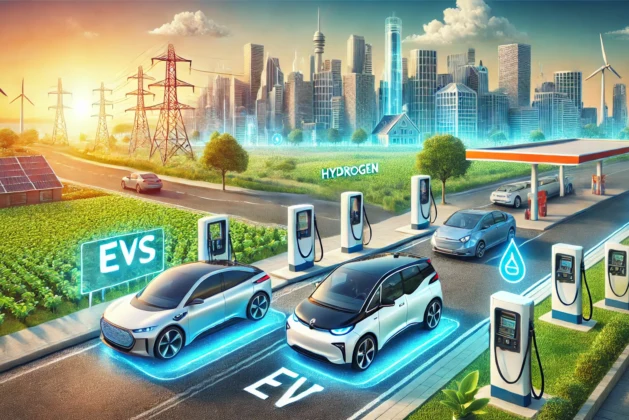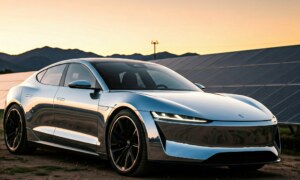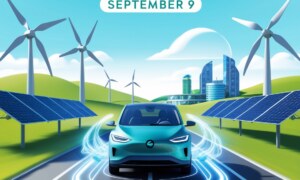The Battle for Clean Energy: EVs vs. Hydrogen
Electric vehicles have seen tremendous growth over the last decade, driven by advancements in battery technology, expanded charging infrastructure, and supportive government policies worldwide. EVs offer an efficient, zero-emission alternative to traditional combustion engines, making them highly attractive in the fight against climate change.
However, hydrogen vehicles have also stepped into the arena, positioning themselves as an alternative clean technology with their own unique benefits.
EVs: Advantages and Challenges
Advantages of EVs:
- Efficiency and Performance: Electric drivetrains are more efficient than internal combustion engines, converting a higher percentage of energy from the battery to power the wheels.
- Mature Technology: EVs benefit from mature battery technology, with options such as lithium-ion and solid-state batteries already commercially viable.
- Growing Infrastructure: The EV charging infrastructure is expanding rapidly, especially in urban areas, and governments are incentivizing the installation of home and public chargers.
- Cost-Effectiveness: As battery costs decline, EVs are becoming more affordable. Additionally, lower maintenance costs make them appealing for long-term ownership.
Challenges for EVs:
- Battery Limitations: Battery energy density still lags behind the energy density of hydrogen and fossil fuels. This can limit range, especially in larger vehicles or colder climates.
- Charging Time: Charging an EV can still take significantly longer than refueling a hydrogen or fossil fuel vehicle, though advancements in fast-charging tech are helping.
- Resource Constraints: EV batteries require materials like lithium, cobalt, and nickel, which are finite and often sourced through environmentally and socially challenging mining processes.
Hydrogen Vehicles: Advantages and Challenges
Advantages of Hydrogen Vehicles:
- Faster Refueling: Refueling a hydrogen vehicle takes only a few minutes, which is on par with traditional gasoline or diesel vehicles.
- Longer Range: Hydrogen has a higher energy density than current EV batteries, offering potentially longer ranges, especially for large vehicles like trucks and buses.
- Environmentally Friendly Fuel Source: When produced sustainably, hydrogen fuel cells emit only water vapor, making them a clean alternative to fossil fuels.
Challenges for Hydrogen Vehicles:
- Limited Infrastructure: Hydrogen refueling stations are scarce, limiting the practicality of hydrogen vehicles, especially in remote or less developed regions.
- High Production Costs: Producing green hydrogen (hydrogen generated with renewable energy) is still costly and energy-intensive.
- Energy Inefficiency: Compared to EVs, hydrogen fuel cells require a more complex energy conversion process, which can reduce overall efficiency.
Fossil Fuel Vehicles: Can They Compete in a Clean Future?
While fossil fuel vehicles dominate the current market, they face increasing pressure from both regulatory policies and consumer preferences for cleaner alternatives. As environmental awareness rises, many cities and countries are implementing bans or restrictions on internal combustion engines (ICE) to curb air pollution and reduce greenhouse gas emissions.
The Future of Fossil Fuel Vehicles
- Decarbonization Policies: Many countries are setting timelines to phase out ICE vehicles, with some targets as early as 2035. This could render fossil fuel vehicles less practical over time.
- Fuel Price Volatility: With fossil fuel prices subject to fluctuations, consumers may shift towards more predictable energy sources like electricity or hydrogen.
- Technological Limits: Unlike EVs or hydrogen vehicles, ICEs are nearing the limit of their efficiency gains, and incremental improvements may not suffice in a decarbonized world.
EVs and Hydrogen: Competition or Complement?
Electric and hydrogen vehicles could complement each other rather than compete directly. While EVs are well-suited for passenger cars and urban transport, hydrogen may find its niche in heavy-duty applications like long-haul trucking, aviation, and shipping, where battery limitations are more pronounced.
The Bottom Line: Will EVs Stand Against the Competition?
The future of transportation may involve a balanced mix of EVs and hydrogen vehicles, each finding their unique applications. EVs, with their lower operating costs and widespread charging networks, are likely to dominate personal and urban mobility. Meanwhile, hydrogen could become a practical choice for specific applications requiring greater range and fast refueling.
In conclusion, EVs seem well-positioned to withstand the competition. Their technology is already mature, infrastructure is rapidly expanding, and continued innovation is likely to address current limitations. While hydrogen and fossil fuel vehicles will persist in niche areas, the momentum and investment in EVs suggest they will lead the charge into a cleaner, greener future.




Excellent writing on pros and cons of present and future energy based technologies